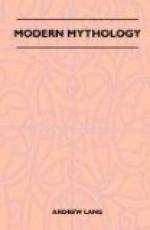On p. 413 our author returns to the charge. He observes (as I have also observed) the often contradictory nature of our evidence. Here I may offer an anecdote. The most celebrated of living English philosophers heard that I was at one time writing a book on the ‘ghostly’ in history, anthropology, and society, old or new, savage or civilised. He kindly dictated a letter to me asking how I could give time and pains to any such marvels. For, he argued, the most unveracious fables were occasionally told about himself in newspapers and social gossip. If evidence cannot be trusted about a living and distinguished British subject, how can it be accepted about hallucinations?
I replied, with respect, that on this principle nothing could be investigated at all. History, justice, trade, everything would be impossible. We must weigh and criticise evidence. As my friendly adviser had written much on savage customs and creeds, he best knew that conflicting testimony, even on his own chosen theme, is not peculiar to ghost stories. In a world of conflicting testimony we live by criticising it. Thus, when Mr. Max Muller says that I call my savages ‘primitive,’ and when I, on the other hand, quote passages in which I explicitly decline to do so, the evidence as to my views is contradictory. Yet the truth can be discovered by careful research.
The application is obvious. We must not despair of truth! As our monitor says, ’we ought to discard all evidence that does not come to us either from a man who was able himself to converse with native races, or who was at least an eye-witness of what he relates.’ Precisely, that is our method. I, for one, do not take even a ghost story at second hand, much less anything so startling as a savage rite. And we discount and allow for every bias and prejudice of our witnesses. I have made a list of these idola in M. R. R. ii. 334-344.
Mr. Max Muller now gives a list of inconsistencies in descriptions of Australian Blacks. They are not Blacks, they have a dash of copper colour! Well, I never said that they had ’the sooty tinge of the African negro.’ Did anybody?
Mr. Ridley thinks that all natives are called ‘Murri.’ Mr. Curr says ‘No.’ Important. We must reserve our judgment.
Missionaries say the Blacks are ‘devoid of moral ideas.’ What missionaries? What anthropologist believes such nonsense? There are differences of opinion about landed property, communal or private. The difference rages among historians of civilised races. So, also, as to portable property. Mr. Curr (Mr. Max Muller’s witness) agrees here with those whose works I chiefly rely on.
‘Mr. McLennan has built a whole social theory on the statement’ (a single statement) ‘made by Sir George Grey, and contradicted by Mr. Curr.’ Mr. McLennan would be, I think, rather surprised at this remark; but what would he do? Why, he would re-examine the whole question, decide by the balance of evidence, and reject, modify, or retain his theory accordingly.




